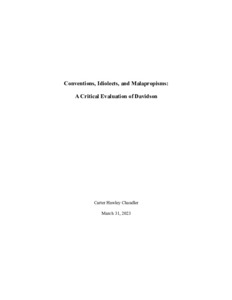| dc.rights.license | In Copyright | en_US |
| dc.creator | Chandler, Carter Hawley | |
| dc.date.accessioned | 2023-04-25T13:58:06Z | |
| dc.date.available | 2023-04-25T13:58:06Z | |
| dc.date.created | 2023 | |
| dc.identifier | WLURG038_Chandler_PHIL_2023 | |
| dc.identifier.uri | http://hdl.handle.net/11021/36206 | |
| dc.description | Thesis; [FULL-TEXT FREELY AVAILABLE ONLINE] | en_US |
| dc.description | Carter Hawley Chandler is a member of the Class of 2023 of Washington and Lee University. | en_US |
| dc.description.abstract | Donald Davidson concludes his 1986 article, "A Nice Derangement of Epitaphs" by making a few seemingly sensational and ambitious claims: "I conclude that there is no such thing as a language, not if a language is anything like what many philosophers and linguists have supposed. There is therefore no such thing to be learned, mastered, or born with. We must give up the idea of a clearly defined shared structure which language-users acquire and then apply to cases. And we should try again to say how convention in any important sense is involved in language; or, as I think, we should give up the attempt to illuminate how we communicate by appeal to conventions."[1]
This article (henceforth "Derangement") addresses two goals. First, it sets out to explain how conversational partners interpret malapropisms (of which the title is one) then goes on to address the consequences of this process on more general questions about language. . . . This paper is a critical discussion of Davidson's argumentation, and it will seek to distill matters to two key points of genuine contention. First is the debate over the primacy of the idiolect (one's inner notions of what words mean and how to use them, or a language with one speaker) in relation to publicly shared languages. The central issue there regards the utility of public conventions in conceptualizing linguistic communication as it actually takes place. This raises the question of whether prior knowledge by speaker and listener is either necessary or
sufficient for successful communication. The other key point relates to pragmatic and metaphilosophical issues. Beyond determining which arguments stand up best to criticism, I will address how different views respond to higher-order concerns about which view of language is best. This paper will be divided into three sections. In the first, I will describe Davidson's opposition to a particular view of language, which stems from his consideration of malapropisms as well as his own conceptualization of communication. In the second section, I will describe objections and reactions from other philosophers to Davidson's views. These relate both to Davidson's ability to justifiably reach his conclusions and the implications of taking his conclusions and recommendations seriously. In the final section, I will contextualize and evaluate the salient points of disagreement between Davidson and his opponents before establishing and discussing conclusions. [From Introduction] | en_US |
| dc.format.extent | 49 pages | en_US |
| dc.language.iso | en_US | en_US |
| dc.rights | This material is made available for use in research, teaching, and private study, pursuant to U.S. Copyright law. The user assumes full responsibility for any use of the materials, including but not limited to, infringement of copyright and publication rights of reproduced materials. Any materials used should be fully credited with the source. | en_US |
| dc.rights.uri | http://rightsstatements.org/vocab/InC/1.0/ | en_US |
| dc.subject.other | Washington and Lee University -- Honors in Philosophy | en_US |
| dc.title | Conventions, Idiolects, and Malapropisms: A Critical Evaluation of Davidson (thesis) | en_US |
| dc.type | Text | en_US |
| dcterms.isPartOf | RG38 - Student Papers | |
| dc.rights.holder | Chandler, Carter Hawley | |
| dc.subject.fast | Language and languages | en_US |
| dc.subject.fast | Information theory | en_US |
| dc.subject.fast | Communication | en_US |
| local.department | Philosophy | en_US |
| local.scholarshiptype | Honors Thesis | en_US |
